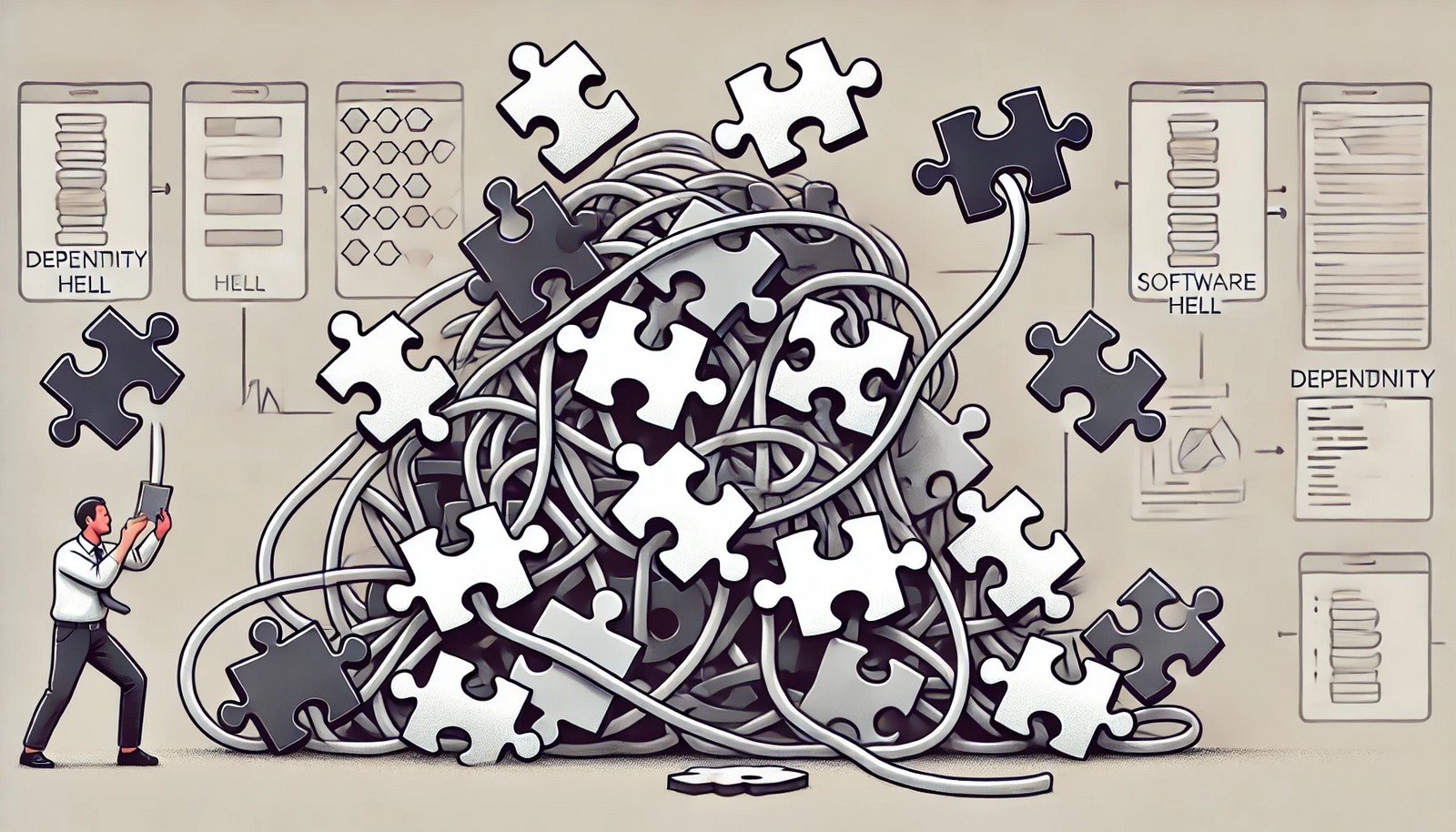Dependency Hell
 (Representational Image | Source: Dall-E)
(Representational Image | Source: Dall-E)
Quick Navigation:
- Dependency Hell Definition
- Dependency Hell Explained Easy
- Dependency Hell Origin
- Dependency Hell Etymology
- Dependency Hell Usage Trends
- Dependency Hell Usage
- Dependency Hell Examples in Context
- Dependency Hell FAQ
- Dependency Hell Related Words
Dependency Hell Definition
Dependency Hell refers to a situation in software development where managing software dependencies becomes excessively complex. It often occurs when different dependencies require conflicting versions of the same library, making it difficult or impossible to satisfy all requirements simultaneously. Dependency Hell is a common challenge in package management systems and software builds, particularly in large-scale projects. Issues like version conflicts, circular dependencies, and transitive dependencies exacerbate this problem, impacting project stability and maintainability.
Dependency Hell Explained Easy
Imagine you're building a LEGO tower, and you need specific blocks for each level. But one store has only the red blocks, another only the blue, and they all have slightly different sizes. You can’t finish your tower because the pieces don’t fit together properly. Dependency Hell is like that in software: different parts of the project need versions of code that don’t work well together.
Dependency Hell Origin
The term originated in software development as projects grew more complex and interconnected. With the rise of modular programming and reusable libraries, developers began encountering increasing challenges in managing dependencies.
Dependency Hell Etymology
The term “Dependency Hell” combines "dependency," referring to the reliance of one software component on another, and "hell," emphasizing the frustration and difficulty caused by this issue.
Dependency Hell Usage Trends
With the proliferation of open-source libraries and frameworks, Dependency Hell has become more prominent. Tools like dependency managers, virtual environments, and containerization solutions have emerged to address this challenge. The problem is particularly relevant in ecosystems like JavaScript (npm), Python (pip), and Java (Maven), where resolving compatibility issues is critical.
Dependency Hell Usage
- Formal/Technical Tagging:
- Software Development
- Dependency Management
- Package Management - Typical Collocations:
- "dependency resolution issue"
- "transitive dependency conflicts"
- "version mismatch in dependencies"
Dependency Hell Examples in Context
- A Python project fails to run because two libraries require conflicting versions of the same package.
- A JavaScript application breaks after an update due to unresolved peer dependencies.
- During software build processes, Dependency Hell prevents successful compilation due to circular dependencies.
Dependency Hell FAQ
- What is Dependency Hell?
Dependency Hell is the difficulty in managing software dependencies, often due to version conflicts or circular dependencies. - Why does Dependency Hell occur?
It arises from incompatible dependency requirements among software components. - What tools help manage Dependency Hell?
Tools like npm, pip, Maven, and Docker are commonly used to manage dependencies. - Can Dependency Hell affect end-users?
Yes, it can lead to bugs, crashes, or inability to install software. - How can developers avoid Dependency Hell?
By using package managers, locking dependency versions, and employing containerization. - Is Dependency Hell avoidable in large projects?
It can be minimized but not entirely avoided due to complex interdependencies. - What is a transitive dependency?
It’s a dependency required by another dependency in your project. - Does Dependency Hell affect modern applications?
Yes, particularly in rapidly evolving ecosystems like JavaScript. - How does containerization help?
It encapsulates dependencies, avoiding system-wide conflicts. - What is semantic versioning?
A system for numbering versions to indicate compatibility and changes.
Dependency Hell Related Words
- Categories/Topics:
- Software Development
- Package Management
- Dependency Management
Did you know?
The term "Dependency Hell" gained prominence with the growth of open-source software ecosystems, where developers often rely on numerous third-party libraries. Tools like Docker and Kubernetes were born partly as a response to manage these complexities, enabling isolated environments for software deployment.
PicDictionary.com is an online dictionary in pictures. If you have questions or suggestions, please reach out to us on WhatsApp or Twitter.Authors | Arjun Vishnu | @ArjunAndVishnu

I am Vishnu. I like AI, Linux, Single Board Computers, and Cloud Computing. I create the web & video content, and I also write for popular websites.
My younger brother, Arjun handles image & video editing. Together, we run a YouTube Channel that's focused on reviewing gadgets and explaining technology.



Comments powered by CComment